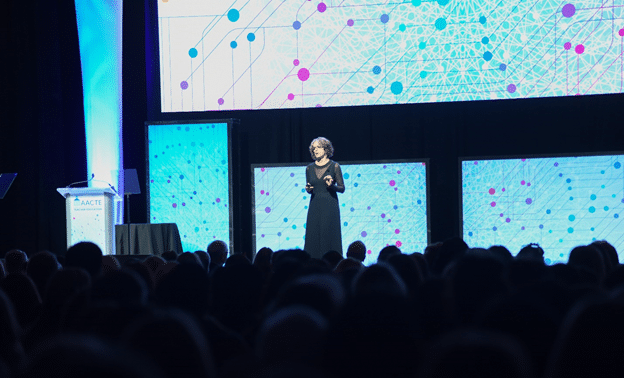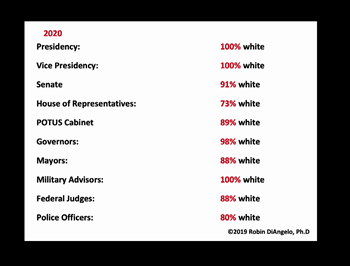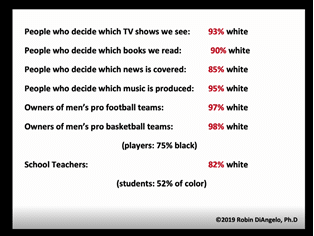Robin DiAngelo Challenges Systemic Racism During #AACTE20 Opening Keynote

The AACTE 2020 Annual Meeting Opening keynote speaker Robin DiAngelo, associate professor of education at the University of Washington, is widely recognized for her research in critical discourse analysis and whiteness studies. In her address, she explored how to implement strategic, intentional anti-racist actions to interrupt the system of racism in education. Her message aligns with AACTE’s core value of diversity, equity, and inclusion an integral part of AACTE’s strategic plan for 2020-23.
“The status quo of this society is racism; it is not an aberration, it’s the norm. All of our institutions effectively and efficiently reproduce racial inequality and schools are the bellies of the beast,” said DiAngelo. She noted that the concept examining the dominant culture is consistently left off the table in the conversation when discussing race issues. These discussions tend to focus on learning about other racial groups.
During her talk, she emphasized the need to decenter “whiteness” by naming it and exposing it, explaining that there is a white worldview, a white frame of reference that allowed her to move through the world from a white experience. DiAngelo shared, “Being white, I was not raised to see myself in racial terms” She reasoned that as a white person, “when we talk about race it’s about their race not mine.” She acknowledged the complexities of racism and the inability to understand every nuance. “But it’s on me to get that information, not on people of color to hand it to us.”
In 2011, DiAngelo coined the term “white fragility” in an academic article, which influenced the national dialogue on race. Her book, White Fragility: Why It’s So Hard For White People To Talk About Racism, was released in June 2018 and debuted on the New York Times Bestseller List. During her keynote, she defined white fragility: The inability to tolerate the racial stress of a challenge to our positions or perspectives. White fragility functions to block the challenge and regain racial equilibrium. White fragility is not weakness per se; it is a powerful means of everyday white racial control as it leverages historical and institutional power. White fragility operates as everyday white racial bullying by making it so miserable for people of color to talk to whites about their inevitable and often unaware racial conditioning. White fragility is defensiveness that functions to refuse to look deeper, to see, to know, or to understand so it’s the sociology of dominance.
“Her message is so profound, so hard-hitting that it fits right in line with a real commitment that AACTE has in diversity and inclusion. What she does is she causes us to have to take very seriously the repercussions for exposing racism, for exposing those areas in folks’ lives where they are not living a diverse life, and they’re not celebrating diversity,” said Michael Dantley, AACTE Board member and chair of the Strategic Planning Task Force.
As part of her keynote address, DiAngelo outlined four challenges of educating white people about racism: opinions that are limited and not informed, using reactions as a way out, being unaffected by the culture we live in, and not understanding the systemic dimensions of racism. She defined systematic racism as a collective racial prejudice backed by legal authority and institutional control. To illustrate her point, she shared slides of the current United States governing bodies with the following examples: president, vice president and military advisors (100% white); governors (98% white); senate (91% white), POTUS cabinet (89% white). She also pointed out the dominant influencers in the country, which included teachers (82% white) and students of color who make up 52% of the school population.


DiAngelo discussed how this racial homogeneity ensures an embedded bias even if it is not intentional. “Overall, white people live the most segregated lives of any group, so we are left with … media to develop our understandings of racial otherness.” She added that this results in the ability to disseminate a white worldview to everyone and at the same time to hold it up as simply universal, simply representing humanity.
A video recording of the full AACTE 2020 Opening Keynote Session is available to Annual Meeting attendees at aacte.org. Additional video recordings, including the Closing Keynote Session and all Deeper Dives from the 72nd Annual Meeting may be accessed in the AACTE Resource Library.
Tags: Annual Meeting, diversity, equity, inclusion






